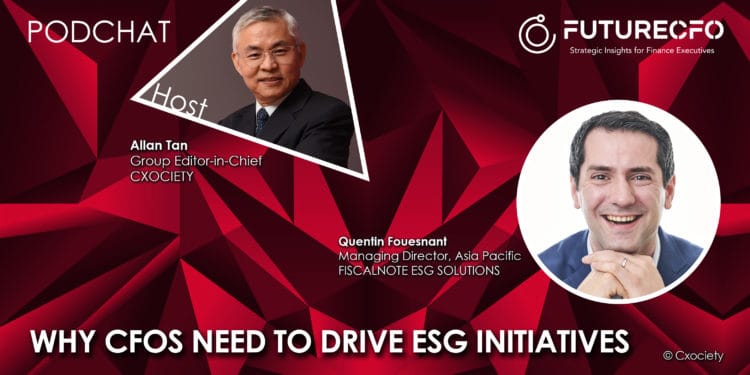Environmental, social and governance (ESG) programs can pose unique challenges to finance chiefs charged with maximizing returns. Reason? Big price tags and longer timelines.
The push from regulators and many stakeholders to transform and align companies with new sustainability goals is an “enduring change,” which carries unique challenges, said Kristin Moyer, distinguished VP and analyst with Gartner.
Moyer says digital business is probably a 10-to-20-year transformation. ESG is a 30-to-40-year transformation.
Acknowledging the many responsibilities that a CFO already has on his or her shoulders, Quentin Fouesnant, managing director for Asia-Pacific at FiscalNote ESG Solutions, there is a synergy to having ESG as one more responsibility.
The CFO needs to make sure the company is financially sound and attractive to investors. “Investors, customers and companies themselves look at ESG data to assess the performance of the company, and whether it is a good investment,” he opined. He elaborated that having a chief sustainability officer (CSO) does not absolve other C-level executives from involvement in ESG.
“I've seen quite a lot of companies where the CFO is the one to wear the CSO hat, showing that there is a vested interest in driving ESG initiatives. I believe it's going to keep on growing because a lot of the financial aspects of the company are really getting affected by the ESG risk and opportunities,” he added.
Preparing to lead ESG

Every role in an organisation requires some understanding of the issues at hand, a willingness to actively participate in shaping the direction, and the determination to see the outcomes.
For Fouesnant, the first step is to bridge the knowledge gap because you need to understand ESG concepts, and internal and investor expectations.
"The next thing is to think about it strategically. It's more than just a compliance process, think about how to embed sustainability within your business strategy."
Quentin Fouesnant
“Next, prioritise what is material for your business, because ESG consists of a lot of subthemes. Then you can go into impact measurement, this will really paint the picture of where you are as a business,” he added.
How can CFOs, who set their sights on ROIs, translate these non-financial metrics as a source of value?
Fouesnant acknowledges that there are some ESG initiatives that might legitimately be judged upon the payback period or an ROI.
“There are a lot of unquantifiable ESG initiatives like diversity and inclusion, health, and safety. There needs to be a mindset shift because you need to see it as a whole - quantitative, qualitative, and non-quantifiable benefits,” he added.
He suggests that having good governance and good ESG performance can also help you attract investors and even get access to new sources of financing like green bonds or sustainability-linked loans.
Should companies integrate their ESG reporting with their financial reporting? Why?
Fouesnant concedes that investors are asking for it, and therefore a company can no longer get away with just disclosing its financial data.
“People want to know, what's your performance around ESG risk and opportunities. CFOs are well placed to do that because the way you treat non-financial data today is like the way you do financial reporting,” he added.
He cited the example of GHG accounting or reporting figures around social and governance: “I would say the rigour and the technical skills that are required by financial professionals can prove very useful.”
How are companies in the Asia Pacific doing in moving forward with their ESG strategies and initiatives? How engaged are the CFOs and the finance department in these initiatives?
Fouesnant believes a lot of progress in the region has been made so far. He cites efforts by the Singapore government to raise the carbon tax which will financially incentivise businesses to cut their emissions. In stock exchanges in Hong Kong, the regulator has made it mandatory to disclose ESG information.
He concedes things are quite uneven throughout the region. “Countries that have lagged because they've been in firefighting mode against the economic consequences of COVID. Overall, I think we'll see things picking up in the next one to two years,” he commented.
What are the challenges CFOs face in helping drive their company’s ESG commitments and how can they resolve them?
Fouesnant suggests that the first thing is to keep up to speed with everything that’s happening with the ESG ecosystem. The next challenge for CFOs is impact measurement. There isn’t a lot of knowledge on how to track ESG data, one of the things that is going to help CFOs a lot is technology which will make the process more efficient.
“Lastly, is getting companies to get past the compliance stage. After companies have gone through ESG disclosures, they should be able to integrate sustainability as a trading strategy and as a competitive advantage,” concluded Fouesnant.
Click on the PodChat player and hear Fouesnant discusses some of the imperatives and challenges CFOs in Asia face as they lead the ESG charge for their respective companies.
- How do you see the role of CFOs in driving the success of their company’s ESG initiatives?
- As CFOs address the issues around ESG, how should they prepare for this? Where should they start? What do they need to know?
- Investors, stakeholders, and management are increasingly asking companies to give quantifiable metrics for their ESG initiatives. Many analysts say that the finance department with its experience in compiling and reporting is a natural fit for this task. However, many CFOs still see non-financial metrics around ESG as costs. How can CFOs, who set their sights on ROIs, translate these non-financial metrics as a source of value?
- Should companies integrate their ESG reporting with their financial reporting? Why?
- Based on your observation, how are companies in the Asia Pacific doing in moving forward with their ESG strategies and initiatives – and how engaged are the CFOs and the finance department in these initiatives?
- What are the challenges CFOs face in helping drive their company’s ESG commitments and how can they resolve them?


